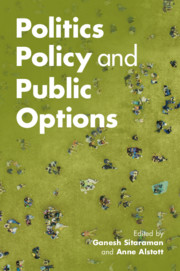
-
Select format
-
- Publisher:
- Cambridge University Press
- Publication date:
- June 2021
- July 2021
- ISBN:
- 9781108767552
- 9781108487641
- 9781108720748
- Creative Commons:
-
This content is Open Access and distributed under the terms of the Creative Commons Attribution licence CC-BY-NC-ND 4.0.
https://creativecommons.org/creativelicenses - Dimensions:
- (229 x 152 mm)
- Weight & Pages:
- 0.41kg, 184 Pages
- Dimensions:
- (229 x 152 mm)
- Weight & Pages:
- 0.28kg, 184 Pages
- Subjects:
- Economics, Macroeconomics, Law and Economics, Law
Open AccessYou have access to this book- Subjects:
- Economics, Macroeconomics, Law and Economics, Law
Book description
A public option is a government-provided social good that exists alongside a similar privately provided good. While the public option is typically identified with health care policy, public options have been a longstanding feature of American life in a variety of sectors, ranging from libraries to swimming pools. Public schools, for example, coexist alongside private schools. However, there is surprisingly little research on 'public options' as a general category. Rather, over the last few decades, considerable scholarly and popular efforts to ensure access to important social goods have focused on market subsidies (like vouchers) or privatization – which both face increasing criticism. Uniting scholars from across disciplines, this volume delves into the theory of the public option, explores several important case studies, and shows how public options could be a corrective to the trend toward privatization and subsidies. This title is also available as Open Access on Cambridge Core.
Contents
Full book PDF-
Politics, Policy, and Public Options
pp i-ii -
-
- You have access
- Open access
- HTML
- Export citation
-
-
Politics, Policy, and Public Options - Title page
pp iii-iii -
-
- You have access
- Open access
- HTML
- Export citation
-
-
Copyright page
pp iv-iv -
-
- You have access
- Open access
- HTML
- Export citation
-
-
Contents
pp v-vi -
-
- You have access
- Open access
- HTML
- Export citation
-
-
Contributors
pp vii-viii -
-
- You have access
- Open access
- HTML
- Export citation
-
-
Acknowledgments
pp ix-x -
-
- You have access
- Open access
- HTML
- Export citation
-
-
Introduction
pp 1-5 -
-
-
- You have access
- Open access
- HTML
- Export citation
-
-
1 - More Than Meets the Eye
pp 6-19 - Government Social Provision and the Politics of “Public Options”
-
-
-
- You have access
- Open access
- HTML
- Export citation
-
-
2 - The Entrepreneurial State and Public Options
pp 20-44 - Socializing Risks and Rewards
-
-
-
- You have access
- Open access
- HTML
- Export citation
-
-
3 - Challenges in Designing Equitable Public Options
pp 45-57 -
-
-
- You have access
- Open access
- HTML
- Export citation
-
-
4 - What about Private Options?
pp 58-79 -
-
-
- You have access
- Open access
- HTML
- Export citation
-
-
6 - The Irony of Health Care’s Public Option
pp 99-116 -
-
-
- You have access
- Open access
- HTML
- Export citation
-
-
7 - Promoting Quality and Equality through Early Education and Care
pp 117-133 -
-
-
- You have access
- Open access
- HTML
- Export citation
-
-
8 - Revamping Public Energy
pp 134-152 -
-
-
- You have access
- Open access
- HTML
- Export citation
-
-
9 - A Public Option in Banking
pp 153-174 - Postal Banking
-
-
-
- You have access
- Open access
- HTML
- Export citation
-
Metrics
Altmetric attention score
Full text views
Full text views help Loading metrics...
Loading metrics...
* Views captured on Cambridge Core between #date#. This data will be updated every 24 hours.
Usage data cannot currently be displayed.
Accessibility standard: Unknown
Why this information is here
This section outlines the accessibility features of this content - including support for screen readers, full keyboard navigation and high-contrast display options. This may not be relevant for you.
Accessibility Information
Accessibility compliance for the PDF of this book is currently unknown and may be updated in the future.

